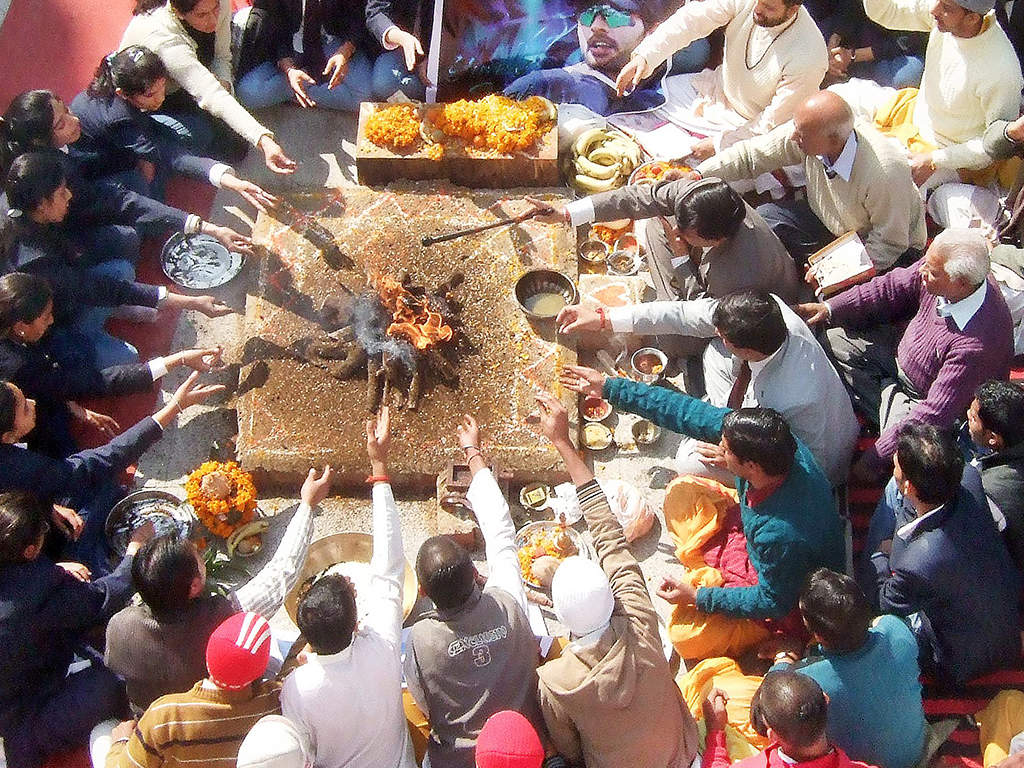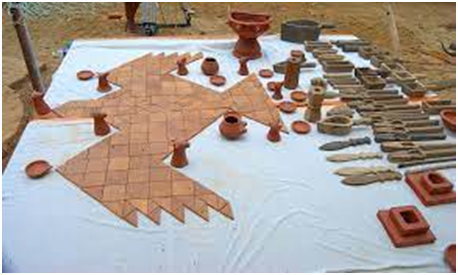Avestic (or Zend)/Old Persian/Arabic languages are all derived from Sanskrit
The Vedic Sanatana civilization was being practiced in this part of the world also. Their philosophy and the practice of worshiping the forces of nature was similar to the one practiced in Vedic Sanatana dharma. Though this region is now largely identified with the abrahamic religions but the signs of Sanatana civilizations can be found abundantly. In the above pictures, the native people of this region celebrate their ancient festival of Nowruz or new year. This festival coincides with the Sanatana new year commencing first month of Chaitra (March-April) each year. The Yava (Java) or barley seeds are sprouted alongwith ghata-sthapana.. These sprouted green crops are dear to the Devi Jagadamba, the Supreme Goddess worshiped during nine days of Navaratra festival in Vedic civilization. The evidence of Vedic Sanatana civilization being practiced by the people of this part of the world can be abundantly seen below. The Vedic deities with similar or slightly different names were being worshiped in pre-Islamic Arab and Persia. The Sanskrit was the prominent language of expression of these people living there at that time.
|
Avestic (or Zend)/Old Persian/Arabic
languages are all derived from Sanskrit |
|
|
Sanskrit Āyu,
life
Avestic
Āyu, life |
|
|
Ajra अज्र
(a field, a plain)
Avestic Ajra, an uncultivated field |
|
|
Snāva स्नाव , a tendon, sinew, muscle, nerve Avestic Snāvarĕ,
a strong cord, a tendon |
|
|
saṃvat संवत्
(a calf, the young of any animal, offspring, child ; wether) ; saṃvat संवत्
saṃ-vatsara a year, in the year ; samā समा.
a half-year ; samā समा Avestic Hama,
summer |
|
|
hiraṇya हिरण्य, gold Avestic zaranya,
gold |
|
|
Horā होरा
(an hour (the 24th part of an aho-rātra-)), a year Avestic Yāre,
a season, a year |
|
|
Apá̄ṃ nápāt अपांनपात् (son of
waters, name of a god; Avestic apąm
napá, descendant ; Apam
Napat is a deity in the Indo-Iranian pantheon associated with water. His
names in the Vedas, Apām Napāt, and in Zoroastrianism, Apąm Napāt, mean
"child of the waters" ) |
|
|
Vāc वाच्
(speech, voice, talk, language (also of animals), sound (also of inanimate
objects as of the stones used for pressing, of a drum etc.))
Avestic vāxš
(vāčem), the voice, and váčas, a word |
|
|
Gav गव् a cow ; G¹av
(Gauh. ): Cosmic Cow, Earth
Avestic Gavaevodata is a primordial
cow in Zoroastrian religion. It was created by Ahura Mazda, the highest deity
of Zoroastrianism. |
|
|
Ārya आर्य
honourable, respectable, noble ;
Avestic Airya. The word Iran comes from Sanskrit word Arya. |
|
|
Sindhu सिन्धु a river, stream ; Avestic Hindu (Ha for Sa),
a name given to the area and people beyond the river Sindhu. |
|
|
Saur सौर (relating or belonging or sacred to or coming from the sun
or the Devata sūrya- ) Khor, Sun, as in Khorshid or Khar as name of lord. Avestic khvēng,
of the sun and khvanvant, sunny (Kha for Sa) |
|
|
akṣa अक्ष (m. an axle, axis ) Old
Persian assis |
|
|
Nīla नील (blue) Persian
nīl, Arabic laylak |
|
|
svapna स्वप्न (sleep,
sleeping ; dreaming, a dream )
Persian
word for sleep is “Khaab” (“Sha to “Kh” ) |
|
|
Rocis रोचिस्
( light, lustre, brightness) :
“Ruz” of
Persian is pronounced as Rôž in Kurdi, Ruž in Kermaanshahan, Rôč in Balochi,
and Roja in Naeen. This word is turned to ‘Jor’ in French which is reverse of
‘Roz’, and in Italian it is ‘Jorno’. This word in Dari Persian is pronounced
as Rôz and Rôz and Rôž, and it used to be pronounced as Rôč in ancient
Pahlavi. All of which were derived Avestan root word of Roâča or Raôčang
which means light. |
|
|
Mitra मित्र
(Name of an āditya- (generally invoked together with varuṇa);
Mithra (Mehr, Mihr, Meher)
, One of the Yazatas in Zarathushtrian) ; Mitra
is an Aryan Sun God who had origins in the Veda. He was a part of the Persian
religion and adapted as Mithras in the Roman empire Since men and Soldiers
primarily worshipped him |
|
|
uṣṭra उष्ट्र
( a camel ) ; Zarat means ancient or old in Sanskrit
Zarathushtra, a religion
of the people of the pre-Islamic Persia |
|
|
Asura असुर
(spiritual, incorporeal, divine ;
Ahura Mazda, Supreme deity
of the Zarathushtra |
|
|
ṛta ऋत
(truth, righteousness) ;
Mazdayasna or medham rtasya,
the religion of Ahura Mazda |
|
|
Yajña यज्ञ (act of worship or devotion, offering, oblation, Yasna) ; An Yajna is a Vedic practice of invoking the Supreme Divine in his Saguna (having the attributes) form and symbolically offering havis (the grita or clarified butter and various other material items) to the invoked deity. There are detailed procedures described in the Sanatana Shastra (scriptures) for this purpose. This process usually requires the support of many people to work together. So it is a collective effort where a large gathering is required. People willing prefer to be a part of this process so as to get connected to the Supreme Divine through the Yajna. The sanantana word Yajna became Jasna in the Persian and Arabic terminology meaning
celebration. |
|
|
Mantra मन्त्र
(a sacred formula addressed to any individual deity)
verse of the Gathas, the Zarathushtra scripture, is called a mathra or manthra) |
|
|
hotṛ होतृ a priest who
at a sacrifice invokes the gods or recites the ṛg-veda;
became zaotar in Avestin |
|
|
Aś अश् prevading / vyāpti; aśman अश्मन् ,
the firmament (the heavens or sky);
Asman (one of the Yazatas)
in Avestin ; |
|
|
Homa होम the act of
making an oblation to the deva-s by
casting clarified butter into the fire (deva-yajña);
Homa is one of the Yazatas
of deity in Avestin. |
|
|
uṣas उषस् daybreak,
dawn, twilight;
Ushah is one of the Yazatas in Avestin
; became subah सुबह in Persian
(Sa for Ha). |
|
|
Sarvatra सर्वत्र everywhere, in
every case, always, at all times ;
Sarvatra became Haurvatat (Ha for Sa), a
deity in Avestin. |
|
|
Amartyatva अमर्त्यत्व immortality;
Became Amaratat (Amaratva), a deity in
Avestin |
|
|
Aryaman अर्यमन् Name
of an āditya- (who is commonly
invoked together with varuṇa- and mitra-, also with bhaga- bṛhaspati-, and others;
Became Airyama, a deity in Avestin. |
|
|
Sarasvatī सरस्वती
became Harahvati ;
another name for the goddess Anahita ; ancient Persian Goddess, a Zoroastrian
Yazata. |
|
|
Rayi रयि possessions,
treasure, wealth;
Became Maza-ray or Maha-ray in Avestin
which means fortune or treasure";
Mazār, plural mazārāt, Arabic in origin,
this word has been borrowed from
Avestin/Persian word Maza-ray or Maha-ray ;
Raees, an Arabic word is also derived
from Sanskrit word Rayi. रयि |
|
|
kṣam क्षम् the ground,
earth;
Later became Zam, Earth in Arabic |
|
|
bṛhaspati बृहस्पति
Sraosa (Br.has-pati): Companion of
Mithra. In later Persia, as Saros or Siroos. |
|
|
tvaṣṭṛ त्वष्टृ "creator
of living beings", the heavenly builder;
Became Thworesta, a deity in Avestin. |
|
|
a
deity Vad (Vata) वात:
Wind ;
Became Baad in Persian means wind (“Ba”
for “Va”). |
|
|
Vivasvan विवस्वन् to shine forth
;
Became Vivanhvant (Vivasvant) meaning
Sun in Avestin. |
|
|
Yama यम,
a Devta
who presides over the pitṛs and rules the spirits of the dead;
Became Yima (Yama); as in Jam or
Jamshed (Yima Khsaeta meaning Yima Radiant") in Avestin. |
|
|
amṛta अमृत immortal ;
Became Amesa in Avestin ; Amesha
Spenta (Immortal Energy) is one of the Yazatas in Zoroastrian. |
|
|
Ahi अहि a snake ;
Became Azi meaning a Dragon. This is
the dragon that covers truth ( Azhi Dahāka ) in Zoroastrian. |
|
|
Yajamāna यजमान
the person paying the cost of a yajna, the institutor of an yajna, (who to
perform it employs a priest or priests;
Became framayisn in
Zoroastrian. |
|
|
Snā स्ना bathing ,
snāna स्नान, bathing ;
Became Nahn (ritual bath ) from snana.
|
|
|
Pāvaka पावक pure, clear,
bright, shining;
Became Pavi, a place to sacrifice in Zorastrian. |
|
|
Urvarā उर्वरा Urvar (urvar):
plant or productive ground;
Became ruvan meaning soul in
Zorastrian. |
|
|
Svāhā स्वाहा an ahuti or
oblation given in the Yajna;
Became Vaha (to praise someone) in
Persian. |
|
|
Yātudhāna यातुधान in the Rigveda
and later denotes a 'sorcerer', 'wizard', or 'magician'); The word Yatu became jadu meaning
magic in Persian. |
|
|
Stotra स्तोत्र praise,
eulogium, a hymn of praise, ode ;
Became Zaothra meaning Worship in
Persian. |
|
|
Āhuti आहुति offering
oblations with fire to the deities;
Became Azuiti meaning plenty in
Persian. |
|
|
Madhu मधु honey (said to
possess intoxicating qualities and to be of 8 kinds ) ;
Madeh in Jund Avestin. |
|
|
Śyena श्येन
coming
from an eagle; Simargl, Skt. श्येन
मृग, śyena-bird.
Became Simurgh in
Persian. In Vedic Sanatana dharama, the great altar was built in the form of the falcon, śyena. Eagle shaped Yajna Kunda used in a Vedic Yajna. |
|
|
Karman कर्मन् act, action,
performance, business ;
Became kurban
in Arabic. |
|
|
Arvan Arvan अर्वन् a courser (a
swift horse), horse;
The name Arab (a land known for swift
horses) derives from Arvan अर्वन्. |
|
|
Ūrj ऊर्ज् to strengthen,
invigorate, refresh ;
Latin urge-o ; Al-Ozi or Ozza, one of
the three prominent female deities worshipped in pre-Islamic Arabia. Pre Islamic Goddesses Al-Lat, Al-Uzza, Manat. These three deities of pre-Islamic Arabic strongly resemble the forms of Jagadamba, the Universal mother, worshipped in Vedic Sanatana dharma. See the roaring lion, the carrier of the Devi and various types of symbols and weapons in the hands of these deities. |
|
|
bhrātṛ भ्रातृ brother (often
used to designate a near relative or an intimate friend, especially as a term
of friendly address) ;
Became Bruder or Biradar in Arabic. |
|
|
mātṛ मातृ mother ;
“Maadar” is Persian (Ta to Da) |
|
|
Brahma ब्रह्म the one
self-existent Supreme, the Absolute ;
Abraham (originally Abram] is the common
patriarch of the Abrahamic religions (Judaism, Christianity, and Islam). |
|
|
śarkarā Śarkarā शर्करा ,
sugar
Arabic sukkar
from Persian šakar. |
|
|
sṛgāla सृगाल a
jackal;
shaghal in Persian |
|
|
Garbha गर्भ interior
chamber, adytum or sanctuary of a temple ;
Kaba is derived from the Sanskrit word
Garbha Graha. |
|
|
Nārikela नारिकेल ;
Nārghīleh
in Persian |
|
|
Tapa तप heat, warmth ;
"causing pain or trouble, distressing";
Tapp in Persian means warm, warmth,
worship and austerity. |
|
|
Abhra अभ्र cloud,
thunder-cloud, rainy weather ;
Abr अब्र cloud In Arabic and Persian. |
|
|
kṣetra क्षेत्र a field ;
khet in Persian |
|
|
vāṅmaya वाङ्मय eloquence,
rhetoric, manner of speech ;
Baang in Persian means ‘to call’ |
|
|
kṣap क्षप् night ;
“Shab” (night) in Persian
("Ba" from"Pa" ). |
|
|
Śakti शक्ति power,
ability, strength, might, effort, energy, capability ;
“Sakht” and “takat” in Persian |
|
|
duṣkara दुष्कर hard to be
done or borne, difficult, arduous ;
Dožvâr or “Dushkhwaar” or “Dushwaar”in
Persian |
|
|
Jāta जात birth, origin
;
Zaad in Persian |
|
|
Śubha शुभ pleasant,
agreeable, suitable, fit, capable, useful, good (applied to persons and
things) ;
“Khoob” in Persian which means good
("Sha" to “Kh”) |
|
|
śoṇa शोण blood ;
“Khoon” in Persian (("Sha"
to “Kh”) ;
Similarly, “Khoshk” in Persian from
Sanskrit “Shushk” (शुष्क) |







Comments
Post a Comment